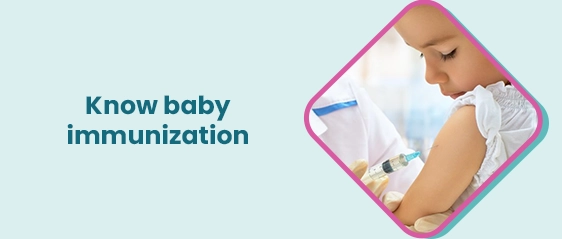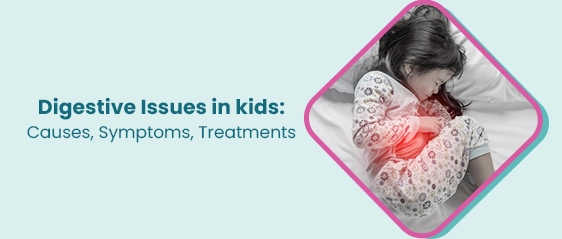
Your Child's Immunization Schedule & Understanding Its Importance
- 14 Aug 2023
Immunization is like a super shield for kids. It's a way to keep them safe from nasty germs that can make them sick. Throughout history, immunization has helped many children stay healthy by stopping dangerous diseases.
Vaccines are like superhero medicine. They've been so powerful that some terrifying diseases are either gone or not so scary anymore. But new infections are also showing up, so giving kids vaccines is super important.
Vaccines work best when given at the right time and in the right amount. Kids are more likely to get sick from certain diseases at different ages. For example, kids under 5 are more likely to get a sickness called polio. That's why they get a particular vaccine for it. Kids who don't get these vaccines late could get very sick. So, it's like giving kids a super shield to keep them strong and healthy.
At Birth:
- BCG Vaccine: A shot in the upper arm to protect against tuberculosis. It may cause a bit of soreness, fever, or headache.
- Oral Polio Vaccine (OPV) - 0 dose: Given by mouth to prevent polio. No common side effects.
- Hepatitis B Birth Dose: An injection to prevent hepatitis B. Usually, just some redness or soreness where the shot was given.
6 Weeks:
- OPV - 1: Oral vaccine to prevent polio. No common side effects.
- Pentavalent - 1: Injection to protect against several diseases. It might cause swelling, mild fever, or fussiness.
- Rotavirus Vaccine (RVV) - 1: Oral or injected to prevent severe diarrhea. Rare mild side effects like diarrhea or vomiting.
- PCV - 1: Injection to guard against infections. It might lead to mild redness, fever, or tiredness.
- Inactivated Polio Vaccine (IPV) - 1: Injection to prevent polio. Some soreness or fever might occur.
10 Weeks:
- Pentavalent - 2: Another shot for protection. Similar side effects as before.
- OPV - 2: More oral polio prevention. No significant side effects.
- RVV - 2: Additional rotavirus protection. Side effects like mild diarrhea or irritation are rare.
14 Weeks:
- Pentavalent - 3: Last in the series for safeguarding. Side effects as before.
- OPV - 3: Final oral polio dose. No significant side effects.
- RVV - 3: Last dose of rotavirus prevention. Rare mild side effects.
- PCV - 2: Final injection for preventing infections. Similar to earlier amounts.
- IPV - 2: Last shot for polio defense. Slight soreness or fever is possible.
9-12 Months:
- Provides defense against measles and rubella
- Potential side effects: Redness, swelling, slight fever.
- Protects Japanese Encephalitis.
- Possible side effects: Fever, headache.
- Protects against pneumonia and other infections.
- Possible side effects: Redness, mild irritability.
Measles & Rubella (MR) - 1
Japanese Encephalitis (JE-1)
Pneumococcal Conjugate Vaccine - Booster
16-24 Months:
- Second dose for measles and rubella protection.
- Potential side effects: Redness, mild fever.
- A final amount of Japanese Encephalitis protection.
- Possible side effects: Fever, headache.
- First booster for diphtheria, pertussis, and tetanus.
- Possible side effects: Soreness, mild fever.
- Boosts protection against poliovirus.
- No common side effects.
Measles & Rubella (MR) - 2
Japanese Encephalitis (JE-2)
Diphtheria Pertussis & Tetanus (DPT) - Booster 1
Oral Polio Vaccine – Booster
5-6 Years:
- Second booster for diphtheria, pertussis, and tetanus.
- Potential side effects: Soreness, mild fever.
Diphtheria Pertussis & Tetanus (DPT) - Booster 2
10 Years:
- Protects against tetanus and diphtheria.
- Potential side effects: Pain, redness, mild fever.
Tetanus & adult Diphtheria (Td)
16 Years:
- Maintains protection against tetanus and diphtheria.
- Potential side effects: Pain, redness, mild fever.
Tetanus & adult Diphtheria (Td)
Keep in mind vaccines are crucial for guarding against severe illnesses. If you have any worries or questions, talk to your healthcare provider.
Reasons why immunization is essential:
- Prevents Deadly Diseases: Vaccines help stop serious illnesses like polio, measles, diphtheria, tetanus, and flu. These illnesses can make people sick and even cause death, especially in kids, old folks, and those with weak immune systems.
- Protects Vulnerable Populations: Some individuals, like newborns and people with certain medical conditions, are more susceptible to infections. By getting vaccinated, you help protect those who can't receive vaccines themselves, creating a shield of immunity around them.
- Reduces Disease Spread: Immunization plays a vital role in controlling the spread of diseases. When a significant portion of the population is immunized, the condition has fewer chances to spread, leading to more occasional outbreaks and even eradication in some cases.
- Saves Lives: Vaccination has reserved millions of lives worldwide. Smallpox, for example, has been completely eradicated through widespread vaccination efforts, and diseases like polio are on the verge of eradication.
- Prevents Complications: Many vaccine-preventable diseases can lead to severe complications, such as blindness, paralysis, brain damage, and organ failure. Immunization significantly reduces the risk of these complications.
- Cost-Effective: Immunization is a cost-effective approach to healthcare. The expenses associated with treating and managing vaccine-preventable diseases are often far higher than the cost of vaccination.
- Promotes Herd Immunity: When a high percentage of a population is vaccinated, it creates herd immunity. This means that even those who cannot be vaccinated (due to medical reasons) are protected because the disease has limited opportunities to spread within the community.
- Prevents Outbreaks: When vaccination rates drop, outbreaks of vaccine-preventable diseases can occur. This was evident in recent measles outbreaks in several countries due to declining vaccination rates.
- Ensures Future Health: Childhood vaccines protect against diseases in the present and contribute to long-term health by reducing the risk of certain conditions later in life.
- Global Health Security: Diseases can quickly travel across borders in a highly interconnected world. By ensuring high immunization rates globally, we contribute to global health security, preventing the resurgence of diseases that may have been eliminated in certain regions.
- Eradication Goals: Immunization efforts have led to the near-eradication of diseases like polio. Continued vaccination campaigns are essential to achieve complete eradication.
- Promotes Research and Innovation: Immunization drives research and innovation in medicine, leading to improved vaccines and better strategies for disease prevention.
- Empowers Individuals: Immunization allows individuals to control their and their communities health. By getting vaccinated, individuals actively participate in disease prevention.
- Community Well-being: Healthy individuals contribute to healthy communities. Immunization fosters overall well-being by reducing the burden of preventable diseases on families, healthcare systems, and society.
- Simple and Accessible: Vaccines are generally easy to administer and are widely available. They are often given through routine healthcare visits, making them accessible to a large portion of the population.
Conclusion
Immunization is of utmost importance. Vaccines, offered through services like Medicover Pediatrics, protect us from diseases that cause much suffering. Getting vaccinated safeguards our health and benefits our communities. Immunization showcases medical progress and human innovation against health challenges, with Medicover Pediatrics contributing to this cause. We must ensure fair access to vaccines, supporting eradication efforts and organizations like Medicover Pediatrics. We shape a safer world by staying informed, advocating, and supporting research, alongside partners like Medicover Pediatrics. Immunization crosses boundaries and cultures, uniting us with providers like Medicover Pediatrics for better health. Let's embrace vaccines as vital to public health, defending against diseases with the aim of a healthier future, supported by Medicover Pediatrics, without preventable illnesses.
Frequently Asked Questions
Why is following my child's immunization schedule important?
Following the immunization schedule ensures your child receives vaccines at the right times, providing maximum protection against diseases during vulnerable periods.
Can't I delay or skip certain vaccines?
Delaying or skipping vaccines can leave your child susceptible to serious illnesses. Following the recommended schedule is designed to provide the best defense.
How does my child's immune system benefit from vaccines?
Vaccines stimulate the immune system to build defenses against diseases, creating immunity without the child having to experience the illness.
What if my child has allergies or a weakened immune system?
Consult your child's healthcare provider about any concerns. Some vaccines might be contraindicated, but your doctor can provide guidance.
Can my child still get the disease even after being vaccinated?
While no vaccine is 100% effective, vaccinated individuals who contract the disease often experience milder symptoms compared to unvaccinated individuals.




